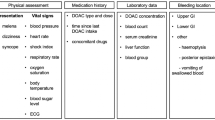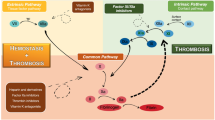Abstract
Glycoprotein (GP) IIb/IIIa receptors on the surface of platelets play a critical role in thrombosis. Intravenous GP IIb/IIIa antagonists abciximab, tirofiban and eptifibatide have demonstrated efficacy in acute coronary syndromes when combined with heparin, aspirin, clopidogrel and percutanous coronary interventions. Results have been less consistent in acute ischaemic stroke. Preclinical data support the potential benefit of these agents both in the microcirculation and in aiding clot lysis. While phase I and II trials of abciximab as the sole agent employing dosages comparable with those used in coronary syndromes were promising, the pivotal phase III trial was abandoned because of an unfavourable benefit-to-risk ratio. New preliminary platelet inhibition measurements from our group suggest that cardiac dosages were likely to be too high for stroke patients. Exploration of lower dosages of abciximab and potentiation with time-limited weight-based heparin along with platelet aggregation inhibition measurement is continuing on a smaller scale. At present, the most common usage of GP IIb/IIIa antagonists in stroke are as adjunctive agents to thrombolysis by intravenous and intra-arterial routes. Substantial progress is likely to require a better understanding of the mechanism of actions and unique pharmacology of GP IIb/IIIa antagonists in ischaemic stroke.
Similar content being viewed by others
References
Bennett JS. Structure and function of the platelet integrin αIIbβ3. J Clin Invest 2005; 115: 3363–9
George JN, Caen JP, Nurden AT. Glanzmann’s thrombasthenia: the spectrum of clinical disease. Blood 1990; 75: 1383–95
Shattil SJ, Newman PJ. Integrins: dynamic scaffolds for adhesion and signaling in platelets. Blood 2004; 104: 1606–15
Xiao T, Takagi J, Coller BS, et al. Structural basis for allostery in integrins and binding to fibrinogen-mimetic therapeutics. Nature 2004; 432: 59–67
Murugappan S, Shankar H, Kunapuli SP. Platelet receptors for adenine nucleotides and thromboxane A 2. Semin Thromb Hemost 2004; 30: 411–8
Lincoff AM, Popma JJ, Ellis SG, et al. Abrupt vessel closure complicating coronary angioplasty: clinical, angiographic and therapeutic profile. J Am Coll Cardiol 1992; 19: 926–35
Gawaz M, Neumann FJ, Ott I, et al. Platelet function in acute myocardial infarction treated with direct angioplasty. Circulation 1996; 93: 229–37
Gawaz M, Neumann FJ, Ott I, et al. Changes in membrane glycoproteins of circulating platelets after coronary stent implantation. Heart 1996; 76: 166–72
Andrews RK, Berndt MC. Platelet physiology and thrombosis. Thromb Res 2004; 114: 447–53
Meadows TA, Bhatt DL. Clinical aspects of platelet inhibitors and thrombus formation. Circ Res 2007; 100: 1261–75
Cura FA, Bhatt DL, Lincoff M, et al. Pronounced benefit of coronary stenting and adjunctive platelet glycoprotein IIb/IIIa inhibition in complex atherosclerotic lesions. Circulation 2000; 102: 28–34
Casserly IP, Topol EJ. Glycoprotein IIb/IIIa antagonists: from bench to practice. Cell Mol Life Sci 2002; 59: 478–500
Coller BS, Folts JD, Smith SR, et al. Abolition of in vivo platelet thrombus formation in primates with monoclonal antibodies to the platelet GPIIb/IIIa receptor: correlation with bleeding time, platelet aggregation, and blockade of GPIIb/IIIa receptors. Circulation 1989; 80: 1766–74
Coller BS. Anti-GPIIb/IIIa drugs: current strategies and future directions. Thromb Haemost 2001; 86: 427–43
Béguin S, Kumar R, Keularts I, et al. fibrin-dependent platelet procoagulant activity requires GPIb receptors and von Willebrand factor. Blood 1999; 93: 564–70
Pancioli AM, Brott TG. Therapeutic potential of platelet glycoprotein IIb/IIIa receptor antagonists in acute ischaemic stroke: scientific rationale and available evidence. CNS Drugs 2004; 18: 981–8
Warkentin TE, Kelton JG. Platelet life cycle: qualitative disorders. In: Handin RI, editor. Blood. 2nd ed. Philadelphia (PA): Lippincott Williams & Wilkins, 2002: 983–1047
Choudhri TF, Hoh BL, Zerwes H-G, et al. Reduced microvascular thrombosis and improved outcome in acute murine stroke by inhibiting GP IIb/IIIa receptor-mediated platelet aggregation. J Clin Invest 1998; 102: 1301–10
Abumiya T, Fitridge R, Mazur C, et al. Integrin αIIbβ3 inhibitor preserves microvascular patency in experimental acute focal cerebral ischemia. Stroke 2000; 31: 1402–10
Gold HK, Garabedian HD, Dinsmore RE, et al. Restoration of coronary flow in myocardial infarction by intravenous chimeric 7E3 antibody without exogenous plasminogen activators: observations in animals and humans. Circulation 1997; 95: 1755–9
Collet JP, Montalescot G, Lesty C, et al. Effects of abciximab on the architecture of platelet-rich clots in patients with acute myocardial infarction undergoing primary coronary intervention. Circulation 2001; 103: 2328–31
Marciniak SJ, Mascelli MA, Furman MI, et al. An additional mechanism of action of abciximab: dispersal of newly formed platelet aggregates. Thromb Haemost 2002; 87: 1020–5
Tsao PW, Forsythe MS, Mousa SA. Dissociation between the anti-aggregatory and anti-secretory effects of platelet integrin alpha IIb beta 3 (GPIIb/IIIa) antagonists, c7E3 and DMP 728. Thromb Res 1997; 88: 137–46
Shuaib A, Yang Y, Nakada MT, et al. Glycoprotein IIb/IIIa antagonist, murine 7E3 F(ab’) 2, and tissue plasminogen activator in focal ischemia: evaluation of efficacy and risk of hemorrhage with combination therapy. J Cereb Blood Flow Metab 2002; 22: 215–22
Eckert B, Koch C, Thomalla G, et al. Aggressive therapy with intravenous abciximab and intra-arterial rtPA and additional PTA/stenting improves clinical outcome in acute vertebrobasilar occlusion: combined local fibrinolysis and intravenous abciximab in acute vertebrobasilar stroke treatment (FAST). Results of a multicenter study. Stroke 2005; 36: 1160–5
Qureshi AI, Harris-Lane P, Kirmani JF, et al. Intra-arterial reteplase and intravenous abciximab in patients with acute ischemic stroke: an open-label, dose-ranging, phase I study. Neurosurgery 2006; 59: 789–96
Pancioli AM, for the CLEAR Trial Investigators. The combined approach to lysis utilizing eptifibatide and rt-PA in acute ischemic stroke (the CLEAR stroke trial): final results form tier I and II [abstract]. Stroke 2008; 39: 531
Seitz RJ, Meisel S, Moll M, et al. The effect of combined thrombolysis with rtPA and tirofiban on ischemic brain lesions. Neurology 2004; 62: 2110–2
Straub S, Junghans U, Jovanovic V, et al. Systemic thrombolysis with recombinant tissue plasminogen activator and tirofiban in acute middle cerebral artery occlusion. Stroke 2004; 35: 705–9
Mangiafico S, Celllerini M, Nencini P, et al. Intravenous tirofiban with intra-arterial urokinase and mechanical thrombolysis in stroke: preliminary experience in 11 cases. Stroke 2005; 36: 2154–8
Ding G, Jiang Q, Zhang L, et al. Analysis of combined treatment of embolie stroke in rat with r-tpa and a GPIIB/IIIa inhibitor. J Cereb Blood Flow Metab 2005; 25: 87–97
The Abciximab in Ischemic Stroke Investigators. Abciximab in acute ischemic stroke: a randomized, double-blind, placebo-controlled, dose-escalation study. Stroke 2000; 31: 601–9
Abciximab Emergent Stroke Treatment Trial Investigators. Emergency administration of abciximab for treatment of patients with acute ischemic stroke: results of a randomized phase 2 trial. Stroke 2005; 36: 880–90
Adams HP, Effron MB, Torner J, et al. Emergency administration of abciximab for treatment of patients with acute ischemic stroke: results of an international phase III trial. Abciximab in Emergency Treatment of Stroke Trial (AbESTT-II). Stroke 2008; 39: 87–99
Mitsias PD, Lu M, Silver B, et al. MRI-guided, open trial of abciximab for ischemic stroke within a 3- to 24-hour window. Neurology 2005; 65: 612–5
Mandava P, Kent TA. Intra-arterial therapies for acute ischemic stroke. Neurology 2007; 68: 2132–9
Lincoff AM, Califf RM, Van de Werf F, et al. Mortality at 1 year with combination platelet glycoprotein IIb/IIIa inhibition and reduced-dose fibrinolytic therapy vs conventional fibrinolytic therapy for acute myocardial infarction: GUSTO V randomized trial. JAMA 2002; 288: 2130–5
Dubois CL, Belmans A, Granger CB, et al. Outcome of urgent and elective percutaneous coronary interventions after pharmacologic reperfusion with tenecteplase combined with unfractionated heparin, enoxaparin, or abciximab. J Am Coll Cardiol 2003; 42: 1178–85
Assessment of the Safety and Efficacy of a New Treatment Strategy with Percuataneous Coronary Intervention (ASSENT-4 PCI) Investigators. Primary versus tenecteplase-facilitated percutaneous coronary intervention in patients with ST-segment elevation acute myocardial infarction (ASSENT-4 PCI): randomised trial. Lancet 2006; 367: 569–78
Cheung RT, Ho DS. Fatal hemorrhagic transformation of acute cerebral infarction after the use of abciximab. Stroke 2000; 31: 2526–7
The National Institute of Neurological Disorders and Stroke rtPA Stroke Study Group. Tissue plasminogen activator for acute ischemic stroke. N Engl J Med 1995; 333: 1581–7
Coller BS, Scudder LE. Inhibitions of dog platelet function by in vivo infusion of F(ab’)2 fragments of a monoclonal antibody to the platelet glycoprotein IIb/IIIa receptor. Blood 1985; 66: 1456–9
Tamberella MR, Bhatt DL, Chew DP, et al. Relation of platelet inactivation with intravenous glycoprotein iib/iiia antagonists to major bleeding (from The GOLD Study). Am J Cardiol 2002; 89: 1429–31
Kleinschnitz C, Pozgajova M, Pham M, et al. Targeting platelets in acute experimental stroke: impact of glycoprotein Ib, VI, and IIb/IIIa blockade on infarct size, functional outcome, and intracranial bleeding. Circulation 2007; 115: 2323–30
Lee KY, Heo JH, Lee SI. Rescue treatment with abciximab in acute ischemic stroke. Neurology 2001; 56: 1585–7
Heo JH, Lee KY, Kim SH. Immediate reocclusion following a successful thrombolysis in acute ischemic stroke: a pilot study. Neurology 2003; 60: 1684–7
Mandava P, Lick SD, Rahman MA, et al. Initial safety experience of abciximab and heparin for acute ischemic stroke. Cerebrovasc Dis 2005; 19: 276–8
Mandava P, Kent TA. Reversal of dense signs predicts recovery in acute ischemic stroke. Stroke 2005; 36: 2490–2
Day JRS, Malik IS, Weerasinghe A, et al. Distinct yet complimentary mechanisms of heparin and glycoprotein IIb/IIIa inhibitors on platelet activation and aggregation: implications for restenosis during percutaneous coronary intervention. Heart 2004; 90: 794–9
Smith WS, Sung G, Saver J, et al. Mechanical thrombectomy for acute ischemic stroke: final results of the Multi MERCI trial. Stroke 2008; 39: 1205–12
Steinhubl SR, Talley DJ, Braden GA, et al. Point-of-care measured platelet inhibition correlates with a reduced risk of an adverse cardiac event after percutaneous coronary intervention: results of the GOLD (AU-Assessing Ultegra) multicenter study. Circulation 2001; 103: 2572–8
Mandava P, Anderson J, Thiagarajan P, et al. Platelet aggregation unit inhibition with abciximab in acute ischemic stroke [abstract]. Stroke 2008; 39: 603
Steinhubl SR, Kottke-Marchant K, Moliterno DJ. Attainment and maintenance of platelet inhibition through standard dosing of abciximab in diabetic and nondiabetic patients undergoing percutaneous coronary intervention. Circulation 1999; 100: 1977–82
Shaltoni H, Martin-Schild S, Khaja A, et al. A phase I study of eptifibatide in acute ischemic stroke. American Academy of Neurology 59th Annual Meeting; 2007 Apr 28–May 5; Boston (MA)
Shaltoni H, Martin-Schild S, Khaja A, et al. Eptifibatide for deteriorating lacunar infarcts. American Academy of Neurology 59th Annual Meeting; 2007 Apr 28–May 5; Boston (MA)
De Luca G, Suryapranata H, Stone GW, et al. Abciximab as adjunctive therapy to reperfusion in acute ST-segment elevation myocardial infarction: a meta-analysis of randomized trials. JAMA 2005; 293: 1759–65
Futrell N. Lacunar infarction: embolism is the key. Stroke 2004; 35: 1778–9
Norrving B. Lacunar infarction: embolism is the key. Against. Stroke 2004; 35: 1779–80
Junghans U, Seitz RJ, Aulich A, et al. Bleeding risk of tirofiban, a nonpeptide GPIIb/IIIa platelet receptor antagonist in progressive stroke: an open pilot study. Cerebrovasc Dis 2001; 12: 308–12
Stone GW, Gersh BJ. Facilitated angioplasty: paradise lost. Lancet 2006; 367: 543–6
National Institutes of Health. ReoPro and retavase to treat acute stroke [online]. Available from URL: http:// www.clinicaltrials.gov/ct/show/NCT00046293 [Accessed 2007 Jul 20]
Saver JL. Time is brain-quantified. Stroke 2006; 37: 263–6
Acknowledgements
No sources of funding were used to assist in the preparation of this manuscript. The authors have no conflicts of interest that are directly relevant to the content of this review.
Author information
Authors and Affiliations
Corresponding author
Rights and permissions
About this article
Cite this article
Mandava, P., Thiagarajan, P. & Kent, T.A. Glycoprotein IIb/IIIa Antagonists in Acute Ischaemic Stroke. Drugs 68, 1019–1028 (2008). https://doi.org/10.2165/00003495-200868080-00001
Published:
Issue Date:
DOI: https://doi.org/10.2165/00003495-200868080-00001




